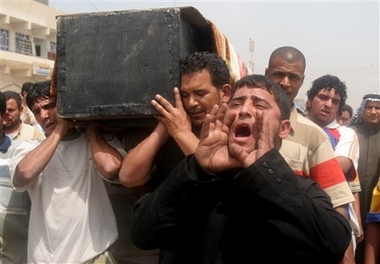Radical cleric's bloc quits Iraq Cabinet
(AP)Updated: 2007-04-17 08:57
BAGHDAD -Iraqi Cabinet ministers loyal to radical cleric Muqtada al-Sadr quit the government Monday, severing the powerful Shiite religious leader from the US-backed prime minister and raising fears al-Sadr's Mahdi Army militia might again confront American troops.
 Relatives carry the coffin of Ahmed Frayih in the Shiite enclave of Sadr City in Baghdad, Iraq, Monday, April 16, 2007. Ahmed was kidnapped by unknown men and found killed on Monday. [AP]  |
In the northern city of Mosul, a university dean, a professor, a policeman's son and 13 soldiers died in attacks bearing the signs of al-Qaida in Iraq. Nationwide, at least 51 people were killed or found dead.
The political drama in Baghdad was not likely to bring down Prime Minister Nouri al-Maliki's government, but it highlighted growing demands among Iraqi politicians and voters that a timetable be set for a US troop withdrawal - the reason al-Sadr gave for the resignations.
The departure of the six ministers also was likely to feed the public perception that al-Maliki is dependent on US support, a position he spent months trying to avoid. Late last year he went so far as to openly defy directives from Washington about legislative and political deadlines.
In an appearance with families of military veterans, President Bush said he had spoken with al-Maliki. "He said, 'Please thank the people in the White House for their sacrifices, and we will continue to work hard to be an ally in this war on terror,'" Bush said.
White House deputy press secretary Dana Perino said al-Sadr's decision to pull his allies from the 37-member Cabinet did not mean al-Maliki would lose his majority in Iraq's parliament.
"I'd remind you that Iraq's system of government is a parliamentary democracy and it's different from our system. So coalitions and those types of parliamentary democracies can come and go," she said.
Sadiq al-Rikabi, an adviser to al-Maliki, told The Associated Press that new Cabinet ministers would be named "within the next few days" and that the prime minister planned to recruit independents not affiliated with any political group. The nominees will need parliament's approval.
The Mahdi Army, the military wing of al-Sadr's political organization, put down its weapons and went underground before the US-Iraqi security crackdown began in Baghdad on Feb. 14 seeking to end sectarian killings and other violence.
Although dozens of the militia's commanders were rounded in the clampdown, al-Sadr kept his militia from fighting back, apparently out of loyalty to al-Maliki, who was elected prime minister with al-Sadr's help.
With the political link severed, there are signs al-Sadr's pledge to control the militia might be broken as well. Forty-two victims of sectarian murders were found in Baghdad the past two days, after a dramatic fall in such killings in recent weeks. US and Iraqi officials have blamed much sectarian bloodshed on Shiite deaths squads associated with the Mahdi Army.
A week ago, on the fourth anniversary of Baghdad's fall to US troops, al-Sadr sent tens of thousands of Iraqis into the streets in a peaceful demonstration in two Shiite holy cities. Protesters burned and ripped US flags and demanded the Americans fix a date for leaving.
"I ask God to provide the Iraqi people with an independent government, far from (US) occupation, that does all it can to serve the people," al-Sadr said in a statement on the Cabinet resignations.
The departure of al-Sadr's allies from the Cabinet did not affect the 30 seats held by his followers in Iraq's 275-member parliament.
"The withdrawal will affect the performance of the government, and will weaken it," said Abdul-Karim al-Ouneizi, a Shiite legislator allied with a branch of the Dawa Party-Iraq Organization, which is headed by al-Maliki.
Saad Taha al-Hashimi, an al-Sadr ally who quit as Iraq's minister of state for provincial affairs, sought to reassure the cleric's supporters that their movement would remain influential.
"This does not mean the Sadrist movement will cease contributing to society," he told reporters. "The movement, as it always has, will remain in society and the government to offer what is best and to push forward the political process."
In violence Monday, at least 13 Iraqi soldiers were killed and four were wounded when more than a dozen gunmen hiding in the back of a truck attacked a military checkpoint near Mosul, police said.
"When the driver approached the checkpoint and reduced speed, preparing to stop for a routine search, all of a sudden more than a dozen gunmen ambushed the checkpoint members and showered them with gunfire," said a security official, who spoke on condition of anonymity out of safety concerns.
Elsewhere in the city, gunmen killed Jaafar Hasan Sadiq, a professor at the University of Mosul's college of arts, as he was driving to work around 8:30 a.m. Five hours later, Talal Younis al-Jalili, dean of the university's college of political science, was slain as he drove home. Shortly after nightfall, gunmen killed the 17-year-old son of a Mosul policeman.
The brazen nature and the targets of the attacks are similar to previous assaults that blamed on al-Qaida in Iraq fighters, who are trying to break Iraqi military resolve and discourage secular activities such as university education.
In Basra, in the deep south of Iraq, about 3,000 protesters angry over inadequate city services marched peacefully through the streets of Iraq's second largest city to demand that the provincial governor resign.
The demonstrators gathered near the Basra mosque, then marched a few hundred yards to Gov. Mohammed al-Waili's office, which was surrounded by Iraqi soldiers and police officers. The protest ended a few hours later.
|
||
|
||
|
|